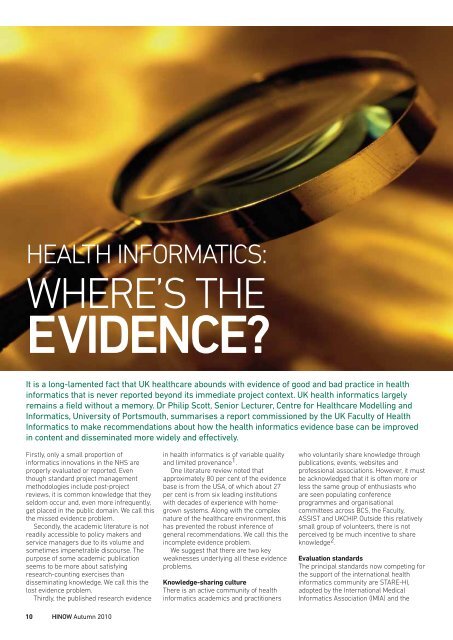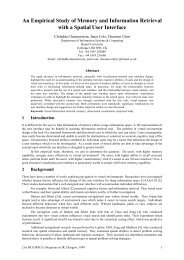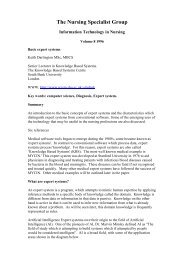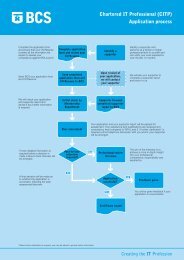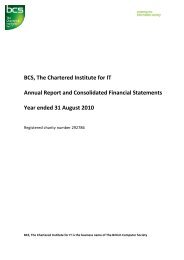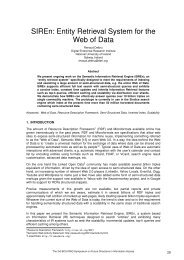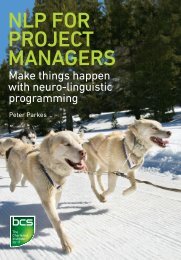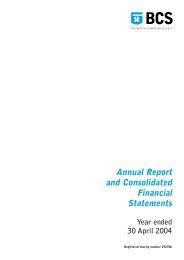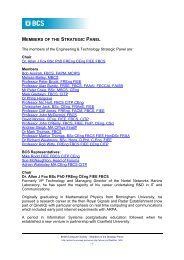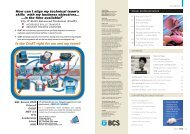DIGITAL DICTATION Reporting on the benefits of digital ... - BCS
DIGITAL DICTATION Reporting on the benefits of digital ... - BCS
DIGITAL DICTATION Reporting on the benefits of digital ... - BCS
Create successful ePaper yourself
Turn your PDF publications into a flip-book with our unique Google optimized e-Paper software.
HEALTH INFORMATICS:<br />
WHERE’S THE<br />
EVIDENCE?<br />
It is a l<strong>on</strong>g-lamented fact that UK healthcare abounds with evidence <strong>of</strong> good and bad practice in health<br />
informatics that is never reported bey<strong>on</strong>d its immediate project c<strong>on</strong>text. UK health informatics largely<br />
remains a field without a memory. Dr Philip Scott, Senior Lecturer, Centre for Healthcare Modelling and<br />
Informatics, University <strong>of</strong> Portsmouth, summarises a report commissi<strong>on</strong>ed by <strong>the</strong> UK Faculty <strong>of</strong> Health<br />
Informatics to make recommendati<strong>on</strong>s about how <strong>the</strong> health informatics evidence base can be improved<br />
in c<strong>on</strong>tent and disseminated more widely and effectively.<br />
Firstly, <strong>on</strong>ly a small proporti<strong>on</strong> <strong>of</strong><br />
informatics innovati<strong>on</strong>s in <strong>the</strong> NHS are<br />
properly evaluated or reported. Even<br />
though standard project management<br />
methodologies include post-project<br />
reviews, it is comm<strong>on</strong> knowledge that <strong>the</strong>y<br />
seldom occur and, even more infrequently,<br />
get placed in <strong>the</strong> public domain. We call this<br />
<strong>the</strong> missed evidence problem.<br />
Sec<strong>on</strong>dly, <strong>the</strong> academic literature is not<br />
readily accessible to policy makers and<br />
service managers due to its volume and<br />
sometimes impenetrable discourse. The<br />
purpose <strong>of</strong> some academic publicati<strong>on</strong><br />
seems to be more about satisfying<br />
research-counting exercises than<br />
disseminating knowledge. We call this <strong>the</strong><br />
lost evidence problem.<br />
Thirdly, <strong>the</strong> published research evidence<br />
10 HINOW Autumn 2010<br />
in health informatics is <strong>of</strong> variable quality<br />
and limited provenance 1 .<br />
One literature review noted that<br />
approximately 80 per cent <strong>of</strong> <strong>the</strong> evidence<br />
base is from <strong>the</strong> USA, <strong>of</strong> which about 27<br />
per cent is from six leading instituti<strong>on</strong>s<br />
with decades <strong>of</strong> experience with homegrown<br />
systems. Al<strong>on</strong>g with <strong>the</strong> complex<br />
nature <strong>of</strong> <strong>the</strong> healthcare envir<strong>on</strong>ment, this<br />
has prevented <strong>the</strong> robust inference <strong>of</strong><br />
general recommendati<strong>on</strong>s. We call this <strong>the</strong><br />
incomplete evidence problem.<br />
We suggest that <strong>the</strong>re are two key<br />
weaknesses underlying all <strong>the</strong>se evidence<br />
problems.<br />
Knowledge-sharing culture<br />
There is an active community <strong>of</strong> health<br />
informatics academics and practiti<strong>on</strong>ers<br />
who voluntarily share knowledge through<br />
publicati<strong>on</strong>s, events, websites and<br />
pr<strong>of</strong>essi<strong>on</strong>al associati<strong>on</strong>s. However, it must<br />
be acknowledged that it is <strong>of</strong>ten more or<br />
less <strong>the</strong> same group <strong>of</strong> enthusiasts who<br />
are seen populating c<strong>on</strong>ference<br />
programmes and organisati<strong>on</strong>al<br />
committees across <strong>BCS</strong>, <strong>the</strong> Faculty,<br />
ASSIST and UKCHIP. Outside this relatively<br />
small group <strong>of</strong> volunteers, <strong>the</strong>re is not<br />
perceived to be much incentive to share<br />
knowledge 2 .<br />
Evaluati<strong>on</strong> standards<br />
The principal standards now competing for<br />
<strong>the</strong> support <strong>of</strong> <strong>the</strong> internati<strong>on</strong>al health<br />
informatics community are STARE-HI,<br />
adopted by <strong>the</strong> Internati<strong>on</strong>al Medical<br />
Informatics Associati<strong>on</strong> (IMIA) and <strong>the</strong>


